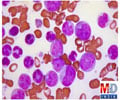A new technique that finds and carefully removes individual sperm from testicular tissue has made fathers of men who were once considered sterile due to prior cancer treatment.

Twenty children have been born to the female partners of men who underwent the technique, known as microdissection testicular sperm extraction (TESE), according to the scientists.
After the sperm was taken from the tissue, they were injected into eggs that had been clinically removed from the women. Of the 73 men in the study, 15 became fathers.
The findings prove the value of this approach in helping men whose fertility had been compromised by chemotherapy treatment, said Peter Schlegel, urologist-in-chief at the Center.
After patients are given anesthesia, surgeons essentially operate inside the testes using a surgical microscope. The testicular tissue is microdissected until sperm is found. TESE is followed by immediate intracytoplasmic sperm injection (ICSI) into eggs to fertilize them.
The men treated in this study had all been treated with chemotherapy for a variety of cancers, including lymphoma, leukemia, testicular (germ cell) cancers and sarcoma.
Advertisement
Half of the women who received fertilized eggs became pregnant, and the live birth rate was 42 percent-there were 15 deliveries with five twin births for a total of 20 healthy children.
Advertisement
The study appeared in the March 14 issue of the Journal of Clinical Oncology.
Source-ANI















